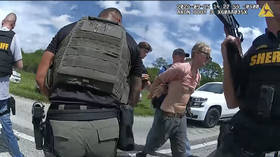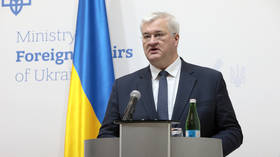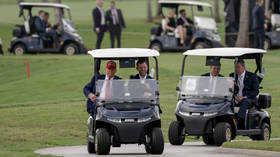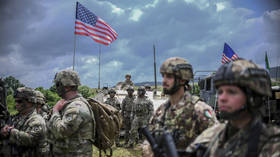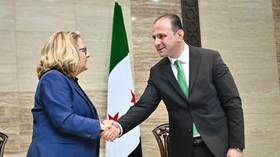CSTO – a NATO for the East?
The members of the Collective Security Treaty Organisation – Russia and six neighbouring states – have agreed to set up a collective rapid reaction force to combat terrorism, military aggression, and drug trafficking.
The decision was made during a CSTO summit in Moscow, attended by the leaders and foreign ministers of the member-states: Russia, Belarus and five countries in the Caucasus and Central Asia – Armenia, Kazakhstan, Kyrgyzstan, Uzbekistan and Tajikistan.
What is CSTO?
* Created on May 15, 1992.
* Main goal: to provide security in the post-Soviet space; to prevent international terrorism and extremism.
* Main threats: Afghanistan and Pakistan.
* Member states: Armenia, Belarus, Kazakhstan, Kyrgyzstan, Russia, Tajikistan, Uzbekistan.
Former member-state: Georgia.
* In 2007 the CSTO signed an agreement with the Shanghai Cooperation Organisation (SCO) to broaden cooperation on issues such as security, crime and drug trafficking.
Armenian President Serzh Sargsyan, the current chair of the group, said the decision was momentous.
“I would like to emphasise the importance of this decision to establish rapid reaction forces. It’s aimed at strengthening the military capacity of our organisation.”
Speaking at a media conference, Russian President Dmitry Medvedev said the new units “will not be less powerful than those of NATO”.
He said: “the reason behind the creation of the collective forces of operative functioning is a considerable conflict potential which is accumulating in the CSTO zone”.
Medvedev added that the force “should become an effective tool which would maintain security in the region”.
Up to now, the organisation has positioned itself as an important political and military alliance in the post-Soviet space. But other countries haven’t perceived it as such.
In theory, the CSTO already has a collective force. But it doesn’t have a common command structure. Nor does it have a permanent home.
However, the decision to create a truly collective force with a permanent location and a united command would propel the alliance to a new level.
Earlier, Russian presidential aide Sergey Prikhodko said the new unit “might be used to rebuff military aggression, conduct special operations against international terrorism and violent manifestations of extremism, transnational organised crime and drugs trafficking, and also for the elimination of effects of natural and technogenic emergencies.”
Under existing arrangements, Prikhodko said, each CSTO member-state had its own rapid reaction force that could be committed to action in case of the emergence of common threats.
The global financial crisis was also talked about. Russia and four neighboring countries – allied in the Eurasian Economic Community (EurAsEc) – decided to give each other a helping hand to cope with the credit crunch.
“We're creating a fund of $10 billion. It will be like an air bag for those states whose situation becomes critical,” commented Belarusian President Aleksandr Lukashenko.
This show of unity comes as Kyrgyzstan confirmed its decision to end the lease of the Manas air base by the U.S. military. Since 2001 it provided backup support for NATO troops in Afghanistan.
But the once-warm welcome has chilled after incidents between locals and military personnel. There have been reports of fights with the local population.
In one incident two women were run over in the capital Bishkek by a vehicle driven by a U.S. serviceman. In another, a Kyrgyz citizen was shot dead by an American soldier who escaped prosecution due to immunity enjoyed by the U.S. military at the base.
Now Kyrgyzstan says the Americans have six months to pack up and leave.
“According to the terms of the agreement American soldiers have 180 days to fully withdraw from the base. The count begins from the moment we exchange formal documents with the U.S.,” Kyrgyzstan’s Security Council chairman Adakhan Madumarov said.



